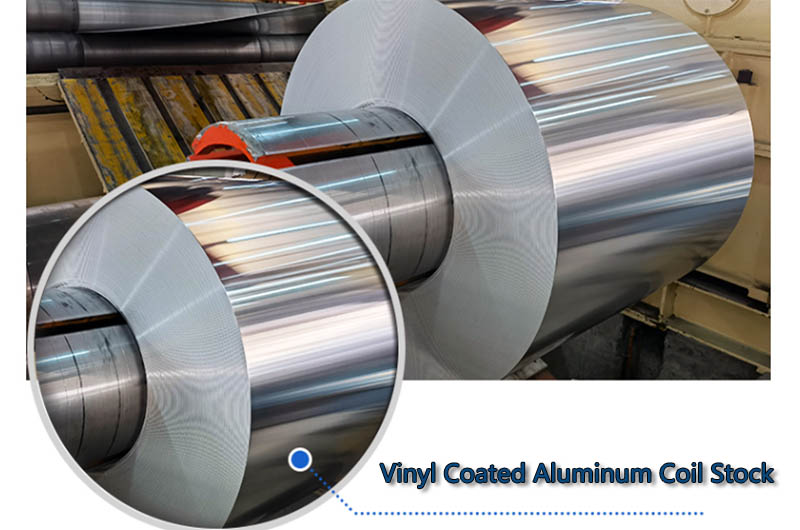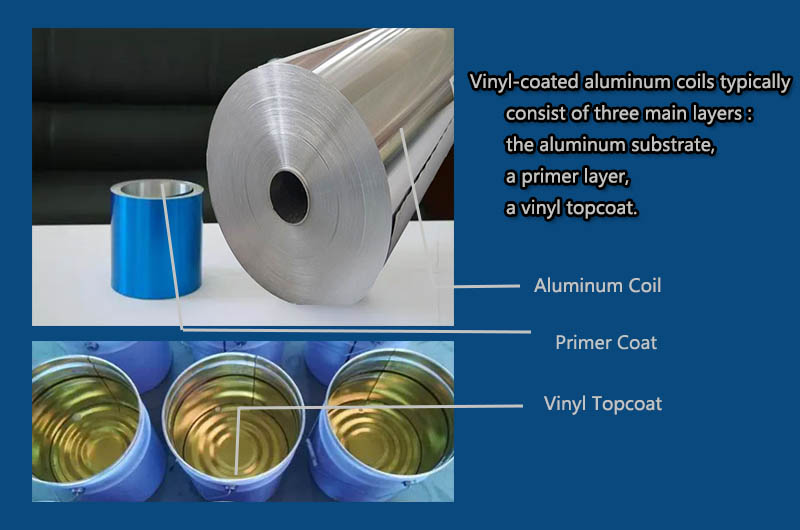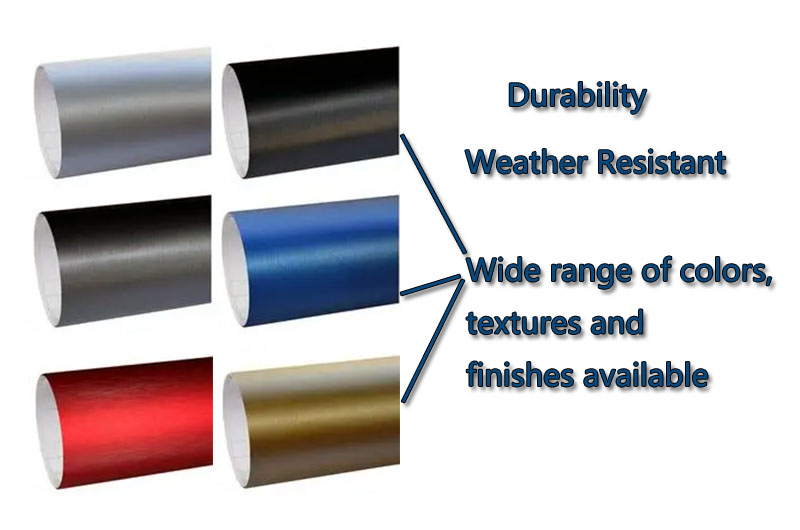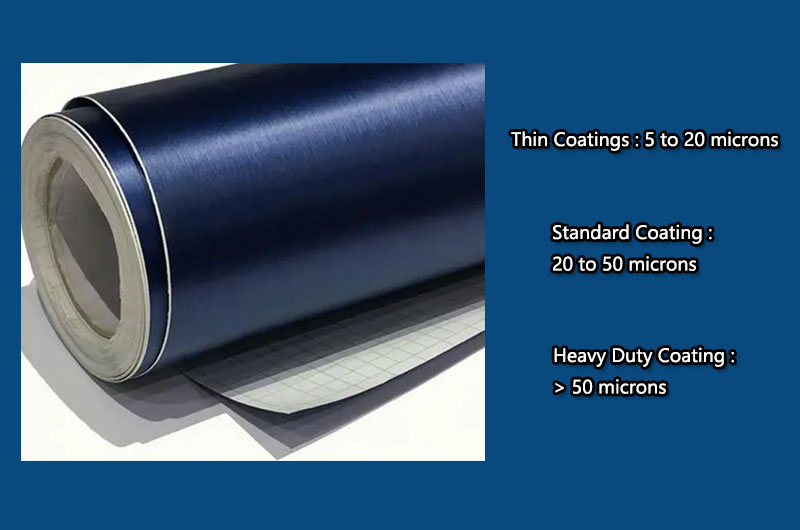Vinyl coated aluminum coils are aluminum coils coated with a layer of vinyl material. This vinyl coating offers extra protection, durability, and aesthetic options for a variety of applications.

Vinyl Coated Aluminum Coil Stock Structure
Vinyl-coated aluminum coils typically consist of three main layers: the aluminum substrate, a primer layer, and a vinyl topcoat. Here's a breakdown of the structure:
- Aluminum Substrate: Aluminum substrate is the base material of the coil. It is usually made of aluminum alloy 3105 or a similar alloy known for its formability, corrosion resistance and weldability. The aluminum base plate provides the strength, lightweight properties and durability of the coil.
- Primer Coat: The primer coat is the first coat applied to the aluminum substrate. It acts as an adhesive between the aluminum surface and the vinyl topcoat. Primers enhance adhesion, promote better durability, and improve the overall performance of vinyl coatings. It helps ensure that the finish adheres well to the aluminum substrate and provides better protection against abrasion, weathering and potential delamination.
- Vinyl Topcoat: The vinyl topcoat is the last layer applied over the primer. It consists of one layer of vinyl that provides the desired color, texture and aesthetic appearance. Vinyl topcoats can come in a variety of colors and finishes, allowing for customization and versatility in design options. It also acts as a protective barrier, increasing resistance to scratches, dents, UV rays, moisture, and environmental elements.

The combination of these layers creates a vinyl coated aluminum coil that offers the benefits of both aluminum and vinyl. Aluminum baseplates provide strength and durability, while primer and vinyl layers provide additional protection, improved adhesion, and aesthetics.
Vinyl Coated Aluminum Coil Stock Features
- Vinyl Coating: Aluminum coils are coated with a layer of vinyl material, which can come in a variety of colors and finishes. Vinyl coating provides an extra layer of protection against scratches, dents, and environmental elements.
- Durability: The vinyl coating enhances the durability of the aluminum coil, making it more resistant to wear and tear. It helps extend the life of the material and maintain its appearance over time.
- Weather Resistant: Vinyl-coated aluminum coils increase resistance to weather conditions, including UV rays, moisture, and temperature fluctuations. This makes it suitable for outdoor applications where long-term performance is required.
- Aesthetic Choices: Vinyl coated aluminum coils come in a variety of colors, textures and finishes, offering a variety of design options. It can mimic the look of other materials, such as wood or stone, while having the advantages of aluminum being lightweight and durable.

Vinyl Coated Aluminum Coil Stock Specifications
| Specification | Range |
|---|---|
| Alloy | Aluminum Alloy 3105 |
| Common Thickness | 0.018" - 0.032" |
| Common Width | 12" - 60" |
| Common Size | 50 ft, 100 ft |
| Coat Thickness | Single coat: 4-6 mils (0.1-0.15 mm) |
| Double coat: 8-12 mils (0.2-0.3 mm) | |
| Number of Coats | Single coat or double coat |
NOTE: Specifications provided are general ranges and may vary by manufacturer and supplier.
Common coating thicknesses for aluminum coils may vary depending on the specific coating system and application requirements. The following are some general ranges for coating thickness:
- Thin Coatings : Thin coatings are typically 0.2 to 0.8 mil (5 to 20 microns) thick. These coatings provide a lightweight protective layer and are typically used in applications where aesthetics are important or minimal protection is required.
- Standard Coating: Standard coatings are typically 0.8 to 2.0 mils (20 to 50 microns) thick. These coatings provide a balance between protection and appearance. They are commonly used in a wide range of applications including construction, automotive components and general industrial purposes.
- Heavy Duty Coating: Heavy duty coatings are thicker than 2.0 mils (50 microns) and can be 10 mils (250 microns) or more. These coatings provide robust protection for applications requiring enhanced durability and resistance to harsh environments or severe wear and tear.

Variations in coating thickness can affect the performance and appearance of aluminum coils. Thicker coatings generally provide greater durability, better resistance to corrosion and abrasion, and longer service life. Thinner coatings may be more cost-effective and suitable for less performance-critical applications.
In terms of application, the choice of coating thickness depends on several factors, including specific application requirements, environmental conditions, expected service life, and aesthetic preference. For example, in architectural applications, a thinner coating may be sufficient to provide an attractive appearance, while in industrial settings or applications exposed to harsh environments, heavier coatings may be preferred.
It is important to note that specific coating thicknesses and their effects on performance may vary between coating systems and manufacturers. It is recommended that the manufacturer or supplier be consulted to determine the proper coating thickness based on specific application and performance requirements.
Vinyl Coated Aluminum Coil Stock Applications
- Exterior Trim: Vinyl-coated aluminum coil is commonly used in exterior trim applications, including door and window frames, fascias, soffits, and corner trim. Vinyl coating provides an attractive finish while protecting the underlying aluminum from the elements.
- Signs and Displays: The durability and aesthetics of vinyl-coated aluminum coils make them suitable for signage and display applications. It can be customized with graphics and logos, offering versatility and long-lasting performance.
- Architectural Trim: Vinyl-coated aluminum coils are used for architectural trim such as column caps, cladding and decorative elements. It provides a visually appealing finish while adding to the durability and resistance of the structure.
- Interior Design: Vinyl coated aluminum coils can be used in interior design applications including wall panels, ceilings and decorative features. It offers durable and low maintenance options while offering a range of design possibilities.
- Transportation: Vinyl-coated aluminum coils are used in the transportation industry for applications such as trailer bodies, RVs, and vehicle trim. Vinyl coating adds durability and aesthetics while maintaining the lightweight properties of aluminum.
It's worth noting that the exact vinyl coating used may vary between different manufacturers and suppliers. Consulting the manufacturer or supplier will provide more detailed information on vinyl coated aluminum coil, its specific properties and available options.

